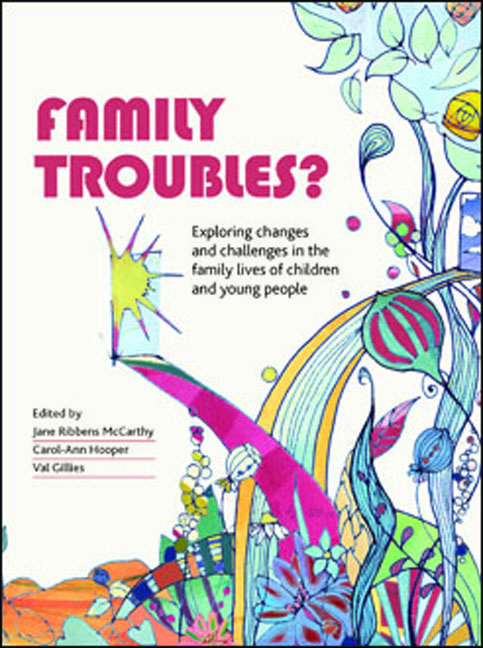Book contents
- Frontmatter
- Contents
- Notes on contributors
- Foreword
- Preface
- 1 Troubling normalities and normal family troubles: diversities, experiences and tensions
- Part One Approaching family troubles ? Contexts and methodologies :Introduction to Part One
- Part Two Whose trouble ? Conteste d definitions and practice: Introduction to Part Two
- Part Three The Normal, The Troubling And The Harmful?: Introduction to Part Three
- Part Four Troubles and transitions across space and culture: Introduction to Part Four
- Part Five Working With Families: Introduction to Part Five
- Index
Foreword
Published online by Cambridge University Press: 07 September 2022
- Frontmatter
- Contents
- Notes on contributors
- Foreword
- Preface
- 1 Troubling normalities and normal family troubles: diversities, experiences and tensions
- Part One Approaching family troubles ? Contexts and methodologies :Introduction to Part One
- Part Two Whose trouble ? Conteste d definitions and practice: Introduction to Part Two
- Part Three The Normal, The Troubling And The Harmful?: Introduction to Part Three
- Part Four Troubles and transitions across space and culture: Introduction to Part Four
- Part Five Working With Families: Introduction to Part Five
- Index
Summary
This vital new collection provides important research evidence alongside new and fresh concepts about what it means to work with families right across the spectrum – from those we might label ‘ordinary’ to those labelled ‘troubled’. The collection makes a very significant contribution to questioning these labels and the assumptions that underpin the labels, and shows that labelling families and individuals within them might obscure as much as or more than it reveals. The wide variety of issues covered, and the thoughtful nature of all the contributions therefore make this a key text for anyone working with children and families. The authors are expert in their field and have made significant contributions to research about families.
The contributions in this collection examine how best to think about ordinary troubles that affect most families, and about families regarded as being troubled and troubling. All families experience troubles from time to time – illness, sibling rivalry, unemployment, migration, bereavement, and other significant life events can affect all of us. Some families and family members cope pretty well, with help and support from family members and friends. Other families or individuals within them may be less resilient. Seeing families as one unit can obscure the different experiences of different family members, including of course of gender, but also of other family relationships such as grandparenting. Many of the chapters in this book provide insights into the complexities and contradictions of individuals’ experiences of their family.
Much research to date has focused on ‘troubling and troubled’ families, exploring the various interventions that might be required, whether or not these interventions are effective, how effectiveness can be measured, and how best children can be protected and supported. But little research has considered how even the most troubled families have aspects of their lives that are ordinary – yet such research has a great deal to tell us about how individuals in families cope and thrive in what appear to be very unpromising circumstances. And the corollary is also true; there has been little research to date that looks at how ‘ordinary’ families deal with troubles, and the impact of ‘troubles’ on individual and family functioning.
- Type
- Chapter
- Information
- Family Troubles?Exploring Changes and Challenges in the Family Lives of Children and Young People, pp. xiii - xivPublisher: Bristol University PressPrint publication year: 2013

